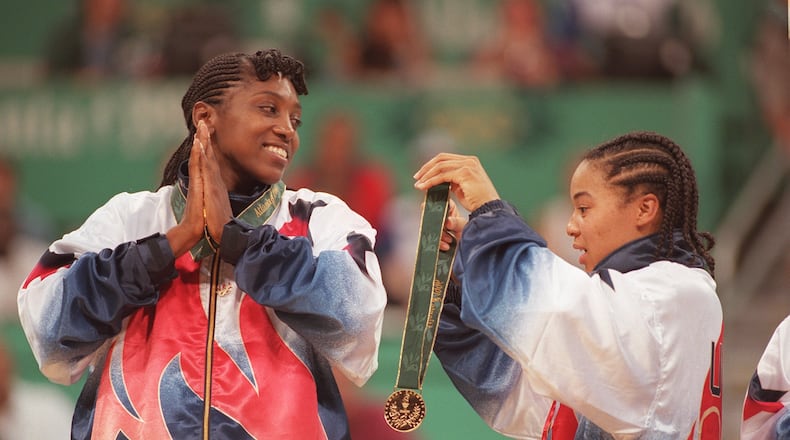On the 25th anniversary of the 1996 Atlanta Olympic Games, The Atlanta Journal-Constitution presents a series of retrospectives produced by the University of Georgia’s Carmical Sports Media Institute. The Eyewitness to History interviews offer the view of someone who was at a top moment on the Summer Games.
After finishing with a bronze medal at the 1992 Olympics and the 1994 world championship, the U.S. women’s basketball team was poised for recovery and victory in 1996.
The team went 52-0 through an unprecedented 10 months of preparation before the Atlanta Games. Women’s basketball was in the budding stages of becoming a professional sport in the United States, and the 1996 U.S. Olympic team, led by head coach Tara VanDerveer, made it one of the Games’ most watched events.
Carol Callan managed the team’s logistics throughout the preparation period and the Games. Now USA Basketball’s women’s national team director, a title she earned after the 1996 Olympics, Callan had an up close and personal relationship with the team.
She was there as a star-studded roster that included Georgia’s own Teresa Edwards, Lisa Leslie, Rebecca Lobo, Dawn Staley and Sheryl Swoopes reclaimed the U.S. women’s place atop the world rankings and won the gold medal in front of 32,987 spectators at the Georgia Dome, with a 111-87 victory against Brazil.
“(Before) we put this national team program together, players were selected through weekend trials. And they would come together for maybe four weeks of preparation before they actually went to an Olympic Games. ... When you bring a team together for just four weeks, and you play a lot of scrimmages, there’s a lot of travel, there’s not a whole lot of time to work on, believe it or not, fundamentals at that level, and defense. So, the biggest difference was the amount of time we had to actually be able to work on all facets of the game. ... The team could really develop as a team.
“Tara VanDerveer, was, is, probably the most competitive person I’ve ever met. She’s also a very curious and honest coach. So, she’s going to really study what works. She was the coach in ’94, when we didn’t win at the World Cup. ... If you’re a smart coach, you learn from your mistakes, you learn from your competitors, and then she had a year to put things into place.
“This group was so devoted to what they were about to foster, which was the professional leagues, the growth of women’s basketball. They had always had to go overseas to play. Now it was going to be possible to stay at home. So, when you invest that much time and purpose, you aren’t going to let things weigh you down.
“Tara and I used to run every other day. In the morning of the gold-medal game in Atlanta, the bombing had occurred, so the streets were empty, it was much more difficult to get around. But we would always go for a run. And that morning, we took off from our hotel, we were staying at the Omni, which is right by the Georgia Dome. We were running and talking about the fact that Tara was still a little bit anxious. We kind of said, ‘We have done everything we can possibly do to prepare. And at some point, you have to trust the players.’
“Now, was I completely confident? Not until we started to play and we were just playing really well. What was amazing was that as well as we were playing -- we scored a lot of points in the first half -- Brazil was right there with us. They had terrific players. They had Hortencia and Magic Paula ... the two that kind of ate us up in ’94. So, I think the history, the moment and the future all just came together in that gold-medal game.
“I think that gold medal game was our best performance. And that’s interesting, because how does that happen? You know, like, sometimes the moment is so overwhelming, you freeze up just a little bit.
“Thirty-two thousand people. They’d never played in front of that many people. I’ll never forget when we were being introduced before the game started and they started to play some pretty upbeat music. Dawn Staley was jumping around. She was so excited to see 32,000 people there. So, everything kept building to this conclusion.
“It was so much satisfaction and relief (to win). Joy came later, for the coaches. I saw Tara and she had tears in her eyes. And of course, she’s thinking about her family, who were there. It’s the sacrifice you’ve made through the years.
“The players, clearly they were excited. They just skipped around the court. ... It was just the joy of winning, of accomplishing an incredible goal, and then the bitter sweetness of, we’re all going to go our separate ways the next day, and we’d never be back together in the same way.
“I thought it was a perfect group of people, a perfect team, and obviously a perfect ending.”
Stefan Caray completed this interview as a student at the University of Georgia’s Carmical Sports Media Institute.
About the Author
Keep Reading
The Latest
Featured


